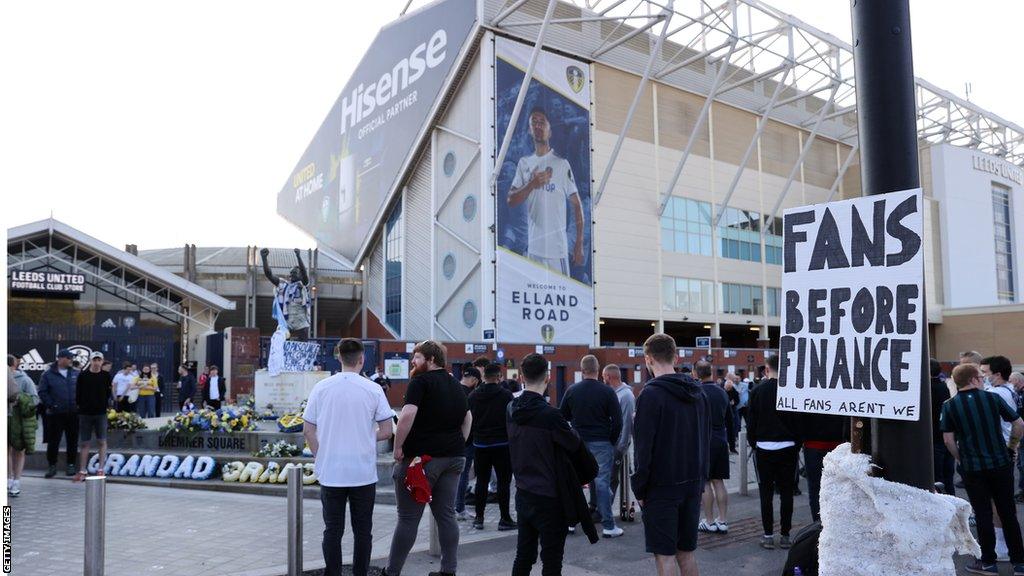Leeds United say independent regulator a risk to finances
- Published

There were protests against the proposed European Super League outside Elland Road in April 2021
Leeds United say the proposed independent football regulator would pose a risk to the club's finances.
The plan for a regulator, recommended by a fan-led review last year, was confirmed by the UK government in February.
It comes as the Whites filed their annual accounts, which showed an operating loss of £34.4m.
Meanwhile, Chelsea also filed their accounts, which showed a £114m loss for 2021-22.
Both clubs submitted their annual accounts to Companies House on Saturday.
Leeds reported an increase in turnover from £171m to £189m, helped by an increase in ticketing revenues from £1.9m to £24.6m following the return of fans to stadiums after the Covid pandemic.
They spent £86m on new players including Daniel James and Junior Firpo, while the dismissal of manager Marcelo Bielsa in February 2022 cost £3.5m.
In their strategic report, Leeds said the primary risk to their finances was relegation from the Premier League. Also listed among the risks was an independent regulator, with the club saying it is predicted to "materially impact both the club's finances and elements of the way it currently operates".
The main purposes of the independent regulator include blocking clubs from joining breakaway leagues that are judged to harm the domestic game, preventing clubs going out of business, giving fans greater input and a new owners' and directors' test.
Chelsea did not describe the regulator as a risk, instead saying they were "looking forward to working with the government and relevant football governing bodies" as elements of the fan-led review "continue to be discussed and implemented".
The Premier League was understood to be wary of a regulatory body when the proposals were announced in April last year.
The league says it is "vital" a regulator does not lead to any "unintended consequences" that could affect its global appeal and success.
Chelsea's losses would have been larger had £142m not been raised from player sales, including Tammy Abraham to Roma, Fikayo Tomori to AC Milan and Kurt Zouma to West Ham.
The club also operated under a special licence from the government for three months from March to May after previous owner Roman Abramovich was sanctioned over alleged links to Russian President Vladimir Putin.
That licence restricted what the club could earn from ticketing and merchandise sales, as well as player trading and the issuing of new contracts.
It was set to expire shortly after a consortium led by American investor Todd Boehly and private equity firm Clearlake Capital completed a £4.25bn takeover of the club in May.
The Blues also paid £49.75m to former directors Bruce Buck and Marina Granovskaia for "services related to the sale" of the club to Boehly.
The accounts do not include the £550m spent on new players under Boehly's ownership in the summer 2022 and January 2023 transfer windows.

Our coverage of Leeds United is bigger and better than ever before - here's everything you need to know to make sure you never miss a moment
